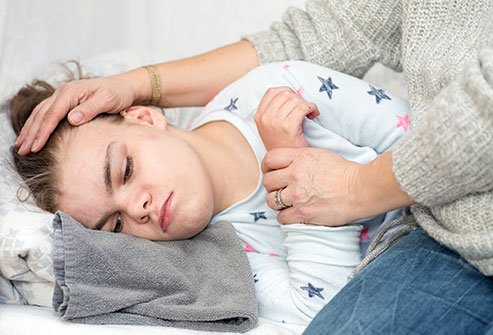Febrile seizures are relatively common. They tend to occur in young children under 6, often as the result of a fever.
Febrile seizures are rarely serious but they can be highly distressing for the child’s parents or caregivers.
Simple febrile seizures
Simple, or “straightforward” febrile seizures tend to only occur once during the course of a child’s illness. They typically last less than 15 minutes and patients will usually have recovered fully within the hour.
Complex febrile seizures
Complex febrile seizures are less common. They tend to feature a partial (focal) seizure, where only one side or limb of the body moves.
Complex febrile seizures also last more than 15 minutes. They can often recur several times in a 24 hour period, or more than once over the course of the child’s illness. Even when an hour or more has passed since a seizure ended, patients may still not have fully recovered.
Following a first febrile seizure, about one-third of children will go on to have recurrent seizures.
Diagnosis and assessment
If you suspect a child is suffering a febrile seizure, assessment should include:
- Identifying the underlying cause of fever, where possible
- Asking about fever onset, peak temperature, duration, and relationship to the seizure
- Identifying red flag symptoms and signs suggesting a serious or life-threatening cause such as meningitis/meningococcal disease or encephalitis, and managing this appropriately
- Asking parents/caregivers about previous seizure episodes and any family history of febrile seizures or epilepsy
- Assessing the child’s temperature, consciousness level, any focal neurological deficit, fluid status, and signs of an alternative cause of seizure.
When should a child be assessed at hospital by a paediatrician?
A child’s care should be escalated if they have never had a febrile seizure before, or if the child is under 18 months of age. Further urgent investigation should also be carried out if the cause of the seizure if uncertain, or if there is any focal neurological deficit, no fever present or if the child has recently taken antibiotics.
Support for parents and carers
Parents/caregivers of a child with a history of febrile seizure should be offered advice on:
- How to recognise a febrile seizure going forward, and how they should manage it
- Ensuring all childhood immunisations are up to date
- Sources of further support and information
Enhance your skills in diagnosing and treating febrile seizures
If you’re a nurse or other healthcare professional and wish to refresh your skills around febrile seizures, then our CPD course Paediatric minor illness may well prove useful.
This course offers the chance to build confidence around various types of illness in children, including febrile seizures. Hands-on and highly interactive, it’s delivered online via Zoom – ideal for social distancing.
The programme is run over 3 consecutive days and is worth 21 hours of CPD. It is currently run online via zoom. Face to face courses may be available after COVID restrictions are eased. Further information and registration can be found on the Practitioner Development UK website. Paediatric minor illness
All course dates are likely to be popular, so sign up today.

